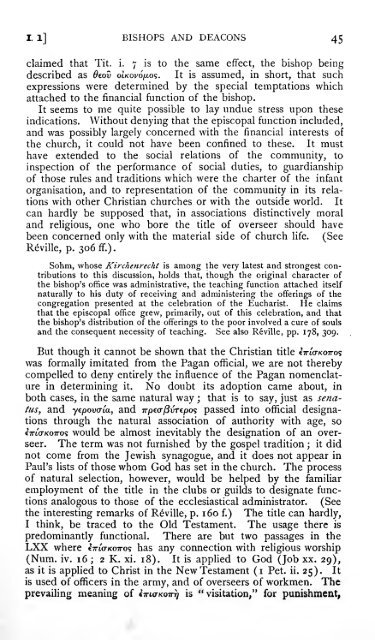Philippians and Philemon - MR Vincent - 1906.pdf
Philippians and Philemon - MR Vincent - 1906.pdf
Philippians and Philemon - MR Vincent - 1906.pdf
You also want an ePaper? Increase the reach of your titles
YUMPU automatically turns print PDFs into web optimized ePapers that Google loves.
I. ] BISHOPS AND DEACONS 45<br />
claimed that Tit. i. 7 is to the same effect, the bishop being<br />
described as Oeov. It is assumed, in short, that such<br />
expressions were determined by the special temptations which<br />
attached to the financial function of the bishop.<br />
It seems to me quite possible to lay undue stress upon these<br />
indications. Without denying that the episcopal function included,<br />
<strong>and</strong> was possibly largely concerned with the financial interests of<br />
the church, it could not have been confined to these. It must<br />
have extended to the social relations of the community, to<br />
inspection of the performance of social duties, to guardianship<br />
of those rules <strong>and</strong> traditions which were the charter of the infant<br />
organisation, <strong>and</strong> to representation of the community in its rela-<br />
tions with other Christian churches or with the outside world. It<br />
can hardly be supposed that, in associations distinctively moral<br />
<strong>and</strong> religious, one who bore the title of overseer should have<br />
been concerned only with the material side of church life. (See<br />
RoviUe, p. 306 ff.).<br />
Sohm, whose Kirchtnrecht is among the very latest <strong>and</strong> strongest contributions<br />
to this discussion, holds that, though the original character of<br />
the bishop's office was administrative, the teaching function attached itself<br />
naturally to his duty of receiving <strong>and</strong> administering the offerings of the<br />
congregation presented at the celebration of the Eucharist. He claims<br />
that the episcopal office grew, primarily, out of this celebration, <strong>and</strong> that<br />
the bishop's distribution of the offerings to the poor involved a cure of souls<br />
<strong>and</strong> the consequent necessity of teaching. See also Reville, pp. 178, 309.<br />
But though it cannot be shown that the Christian title<br />
was formally imitated from the Pagan official, we are not thereby<br />
compelled to deny entirely the influence of the Pagan nomenclature<br />
in determining it. No doubt its adoption came about, in<br />
both cases, in the same natural way ; that is to say, just as senatus,<br />
<strong>and</strong>,<strong>and</strong> passed into official designa-<br />
tions through the natural association of authority with age, so<br />
€would be almost inevitably the designation of an overseer.<br />
The term was not furnished by the gospel tradition ; it did<br />
not come from the Jewish synagogue, <strong>and</strong> it does not appear in<br />
Paul's lists of those whom God has set in the church. The process<br />
of natural selection, however, would be helped by the familiar<br />
employment of the title in the clubs or guilds to designate functions<br />
analogous to those of the ecclesiastical administrator. (See<br />
the interesting remarks of Reville, p. 160 f.) The title can hardly,<br />
I think, be traced to the Old Testament. The usage there is<br />
predominantly functional. There are but two passages in the<br />
LXX where?has any connection with religious worship<br />
(Num. iv. 16 ; 2 K. xi. 18). It is applied to God (Job xx. 29),<br />
as it is applied to Christ in the New Testament (i Pet. ii. 25). It<br />
is used of officers in the army, <strong>and</strong> of overseers of workmen. The<br />
prevaiUng meaning of is "visitation," for punishment,





